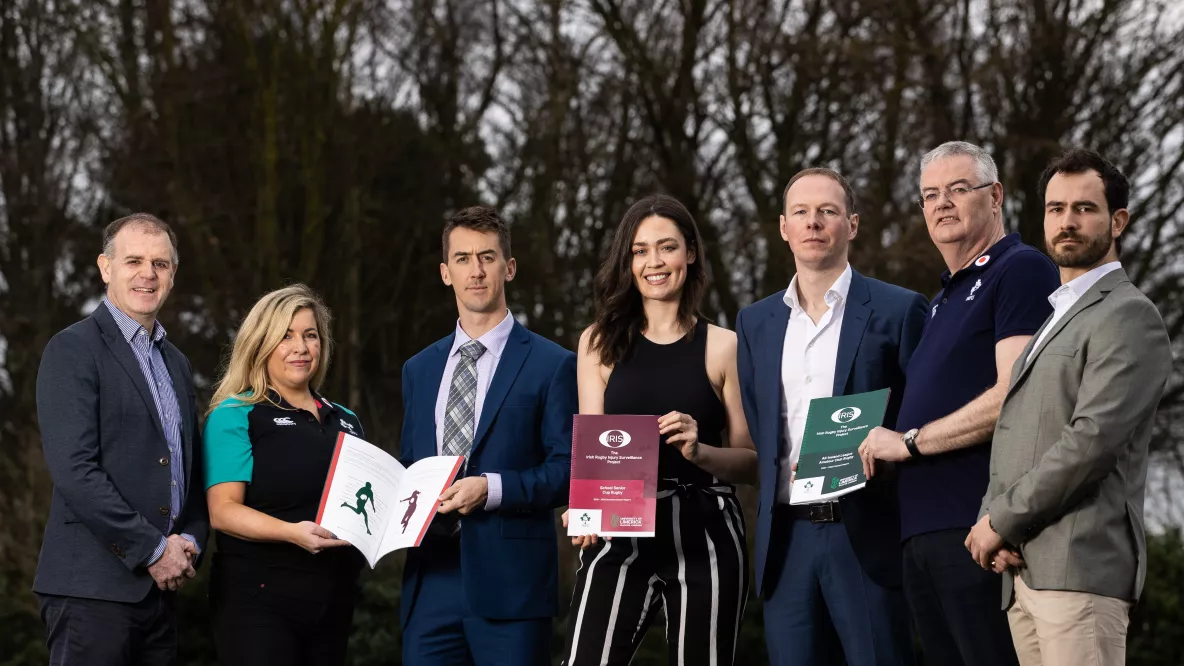
University of Limerick and the Irish Rugby Football Union have released the fourth year of findings from the Irish Rugby Injury Surveillance (IRIS) research project, which looks at injury incidence in the Men’s and Women’s All-Ireland League during the 2021/22 season.
A focused two-year analysis of Schoolboy Senior Cup surveillance for 2018-2020, authored by researcher Dr Therese Leahy, has also been produced. Due to COVID-19 related player and staff absences during the 2021/22 season limited schoolboy data was collected for this season.
In 2022 the IRFU and the University of Limerick agreed an eight-year extension of their valuable collaboration on the IRIS project to 2030. Originally formed in 2016 funded by the IRFU, IRIS has expanded nationally and internationally to provide further insight into player welfare at all levels of the game.
IRIS research records the incidence, type, nature and severity of both match and training injuries occurring across the amateur game in Ireland. By monitoring this information the IRFU, with an understanding of injury trends, has developed ‘ENGAGE’; a player robustness and injury prevention programme in order to minimise injury risk and enhance player performance and welfare.
Download the latest All-Ireland League amateur club rugby report
Download the latest Schools Senior Cup rugby report
The club data were compiled by researcher Patrick Dolan across 430 matches (versus 388 for 2019/20) from 21 All-Ireland League and Women’s All-Ireland League clubs. In the schools game, data from 220 matches at Senior Cup level were recorded. A total of 709 male, 129 female players were registered with the IRIS project for the 2021/22 season, and 339 schoolboy players for the 2018-2020 seasons.
Injury Frequency:
A male player would have to play 14 matches to sustain one injury (down from 15). Injury incidence rate 55.0/1,000 player hours (up from 49.1)
A female player would have to play 25 matches to sustain one injury (up from 21). Injury incidence rate 29.8/1,000 player hours (down from 34.9)
A School Senior Cup player would have to play on average 16 matches to sustain one injury (down from 20). Injury incidence rate 53.6/1,000 player hours
Senior Club Injury Event:
53% of match and training injuries are result of the tackle (down from 56%)
61% of tackle related injuries sustained by the ball carrier (up from 47%)
39% of tackle related injuries sustained by the tackler (down from 53%)
Male Club Match Injury Occurrence:
7.6/1,000 player hours: concussion (up from 7.1/1,000)
5.3/1,000 player hours: ankle ligament sprain (up from 4.5/1,000)
4.6/1,000 player hours: hamstring strain (up from 2.9/1,000)
Female Club Match Injury Occurrence:
3.6/1,000 player hours: concussion (down from 5.6/1,000)
4.8/1,000 player hours: ankle sprains (down from 4.8/1,000)
2.9/1,000 player hours: finger sprains (knee 1.4/1,000 was previously 3rd placed)
School Senior Cup Match Injury Occurrence:
7.5/1,000 player hours: concussion (down from 9.6/1,000)
7.0/1,000 player hours: ankle sprain (up from 4.1/1,000)
5.2/1,000 player hours: ACJ sprain (up from 3.2/1,000 – 2018/19)
Dr Rod McLoughlin, the IRFU’s Medical Director, said: “The IRFU is delighted to renew its support of the IRIS Project, through to 2030, which will see three additional PhD researchers join the IRIS Research Team. Injury and illness surveillance is at the heart of the Irish Rugby Injury Surveillance (IRIS) project. It is a fundamental component of focused efforts to protect the health of the players. Carefully designed injury surveillance programmes, accurate data capture and careful analysis are building blocks that help us keep players safe and ensure everyone can play the game to their fullest potential.
“This second phase of the IRIS Project will see expansion across both the boys’ and girls’ schools’ game, investigation of mental health and injury burden and further development of evidence-based injury prevention strategies.
“The IRFU is dedicated to enhancing player welfare and improving performance across the game, and results from the IRIS project have led to the development of a nationwide rugby readiness and robustness programme. The IRFU ENGAGE programme, which was launched in September 2021, further helps players prepare for the demands of the game and continue performing to their best.”
Dr Tom Comyns, IRIS co-principal investigator at University of Limerick, said: “Comprehensive injury surveillance systems in amateur Rugby Union recommenced within the male and female club setting during the 2021/22 season following the lack of training, games and surveillance during the 2020/21 season due to the Covid-19 pandemic. This has allowed the project to continue to provide insight into key injury surveillance variables, such as match-injury incidence rates, injury frequency, match injury event and injury occurrence.
“The 2021/22 season also saw the implementation of a research project examining the effectiveness and feasibility of the IRFU ENGAGE programme by PhD researcher Patrick Dolan which has been designed in response to key findings from the IRIS surveillance research to date and aims to reduce the injury rates of players and thus enhance player welfare.
“IRIS project team and principal investigators would like to thank the continued support of the clubs and schools in this innovative project and welcome the extension of funding and support from the IRFU to 2030.”
Professor Ian Kenny, IRIS co-principal investigator at University of Limerick, said: “The pandemic primarily impacted schools surveillance over the past two seasons. No school competitions ran during the 2020-2021 season and while some surveillance took place during the 2021-2022 season, this was very limited in schools due to the direct effects of Covid-19 on school Rugby staff and player absences. The injury report is compiled to give an overview of injury trends in Senior Cup school Rugby across two seasons, 2018-2019 and will be a useful comparison for everyone involved in the forthcoming 2022/23 schools season, which greatly expanded recruitment nationwide but particularly into Leinster this season.
“The IRIS group are working closely with the IRFU to use these data to answer pertinent questions for the game for example on artificial surface injury trends, ENGAGE injury reduction programme effects, and women’s game specific issues.”